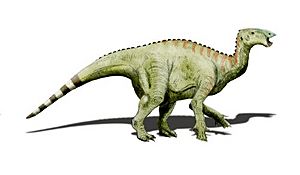Hypselospinus facts for kids
Quick facts for kids Hypselospinus |
|
|---|---|
 |
|
| Restoration | |
| Scientific classification |
|
| Kingdom: | Animalia |
| Phylum: | Chordata |
| Clade: | Dinosauria |
| Order: | †Ornithischia |
| Suborder: | †Ornithopoda |
| Clade: | †Ankylopollexia |
| Clade: | †Styracosterna |
| Genus: | †Hypselospinus Norman, 2010 |
| Species: |
†H. fittoni
|
| Binomial name | |
| †Hypselospinus fittoni |
|
| Script error: The function "autoWithCaption" does not exist. | |
| Synonyms | |
|
|
Script error: No such module "Check for conflicting parameters".
Hypselospinus was a type of dinosaur that belonged to a group called iguanodontians. It was first identified as a new species in 1889 by Richard Lydekker, who thought it was a type of Iguanodon. He named it Iguanodon fittoni to honor William Henry Fitton. Later, in 2010, scientists decided it was different enough to have its own genus, Hypselospinus. This dinosaur grew to be about 6 meters (19.7 feet) long, which is roughly the length of a small school bus.
Contents
What Was Hypselospinus?
Hypselospinus was a plant-eating dinosaur. It lived during the Cretaceous Period, a long time ago. Its name means "high spine," which might refer to some of its backbones. It was part of a larger family of dinosaurs known as ornithischians, which are often called "bird-hipped" dinosaurs because of the shape of their hip bones.
When and Where Did It Live?
Hypselospinus lived during the Early Cretaceous period. This was about 140 million years ago. Its fossils have been found in England, specifically in areas that were once part of ancient floodplains or river deltas. This tells us about the environment it lived in.
How Do We Know About It?
Scientists learn about dinosaurs like Hypselospinus from their fossils. These are the preserved remains or traces of ancient life. The first fossils of Hypselospinus were found in England. These bones helped scientists understand what the dinosaur looked like and how big it was. Studying fossils helps us piece together the puzzle of life on Earth millions of years ago.
Images for kids
 | Kyle Baker |
 | Joseph Yoakum |
 | Laura Wheeler Waring |
 | Henry Ossawa Tanner |


